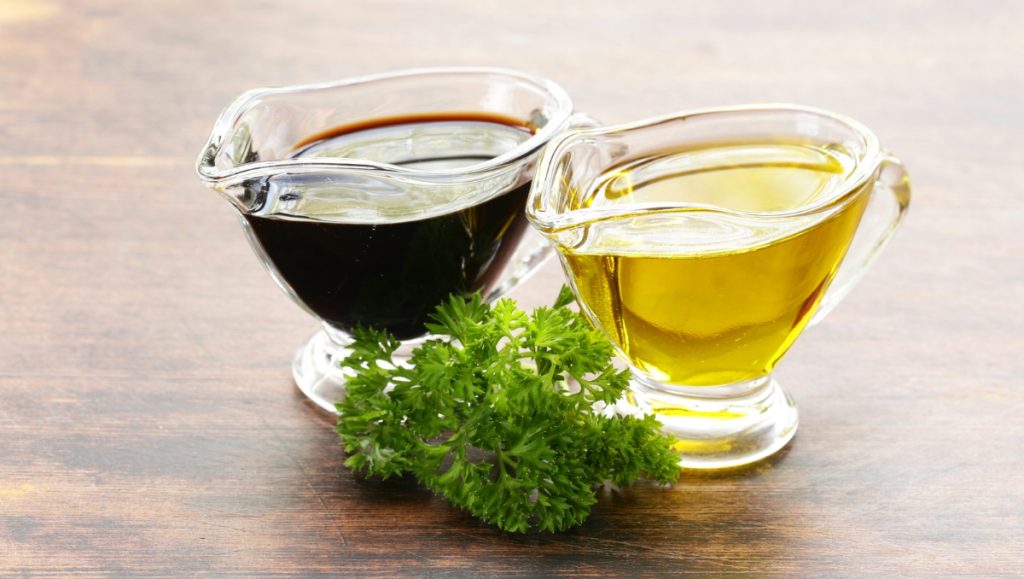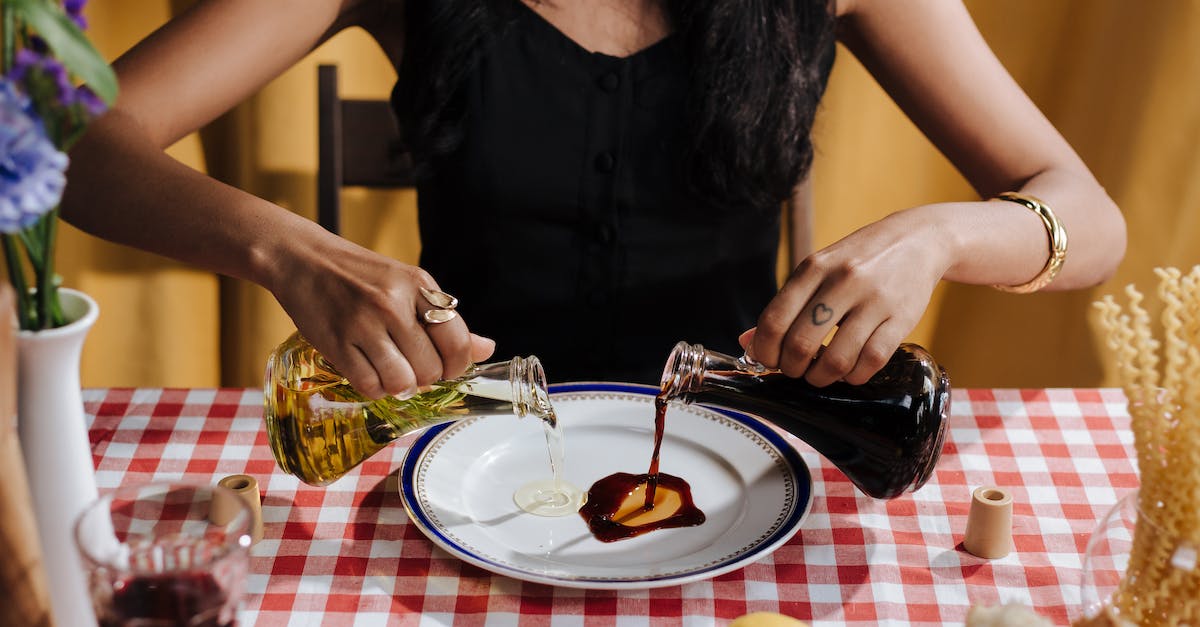This post contains affiliate links. See the affiliate disclaimer here.
Are you wondering if balsamic vinegar can go bad? Well, you’re not alone. Balsamic vinegar is a beloved condiment that adds a rich and tangy flavor to salads, marinades, and sauces. But like any food, it has a shelf life. In this article, we’ll explore the topic of balsamic vinegar expiration and answer some common questions about its storage and longevity.
Does Balsamic Vinegar Expire?

Balsamic vinegar, like any food, has a shelf life and can go bad over time. However, the good news is that it has a long shelf life if stored properly. The precise answer to how long balsamic vinegar lasts depends on the storage conditions.
To maximize the shelf life of balsamic vinegar, it is important to store it in a cool, dark cupboard away from direct heat or sunlight. This helps prevent the vinegar from oxidizing and developing off flavors. Additionally, it is recommended to keep the bottle tightly sealed after opening.
Properly stored balsamic vinegar will generally stay at its best quality for about 3 years. However, it will stay safe to use indefinitely. The expiration date on the package is not a safety date but rather an estimate by the manufacturer of how long the vinegar will remain at peak quality.
It is worth noting that commercially packaged balsamic vinegar does not spoil. However, the appearance and flavor may start to deteriorate over time. As long as the vinegar is properly stored and the package is undamaged, it is safe to use even after the expiration date.
So, while balsamic vinegar does have a shelf life, you can enjoy its rich and tangy flavor for an extended period if you follow proper storage practices.
Signs of Expired Balsamic Vinegar
When it comes to balsamic vinegar, it doesn’t technically expire like other foods. However, over time, it can lose its flavor, aroma, and quality. To ensure that you’re using the best balsamic vinegar in your dishes, it’s important to be aware of the signs that it may have gone bad.
Here are a few key indicators that your balsamic vinegar may have expired:
- Smell: If you notice an off, sour, or musty smell, your balsamic vinegar has likely gone bad. A fresh bottle of balsamic vinegar should have a pleasant, sweet aroma.
- Cloudy appearance: Take a look at the vinegar in the bottle. If you see that it appears cloudy or there is sediment at the bottom, it may have spoiled.
- Change in flavor: Expired balsamic vinegar may taste sour or have an off flavor. If it doesn’t taste as sweet or tangy as it used to, it’s a sign that the quality has deteriorated.
- Changes in color: Pay attention to the color of your balsamic vinegar. If it has turned darker or developed an unusual hue, it may be a sign that it has gone bad.
It’s essential to note that these signs can vary depending on the specific brand and type of balsamic vinegar. Therefore, it’s important to trust your senses and use your best judgment. If in doubt, it’s better to err on the side of caution and replace your balsamic vinegar with a fresh bottle.
Remember, while the shelf life of balsamic vinegar can be extended through proper storage, it is still susceptible to deterioration over time. By being aware of these signs, you can ensure that you’re using the best-quality balsamic vinegar in your culinary creations.
Shelf Life of Balsamic Vinegar
When it comes to the shelf life of balsamic vinegar, you may be pleased to know that if stored properly, it can last for a long time. Proper storage helps prevent oxidation and the development of off-flavors. Here’s what you need to know about the shelf life of balsamic vinegar:
- Storage Conditions: The key to maximizing the shelf life of balsamic vinegar is to store it in a cool, dark cupboard away from direct heat or sunlight. This helps maintain its flavor and quality over time.
- Sealing the Bottle: After opening a bottle of balsamic vinegar, be sure to keep it tightly sealed to prevent air from entering and spoiling the vinegar. This will help preserve its freshness and ensure it stays at its best quality.
- Expiration Date: While commercially packaged balsamic vinegar may have an expiration date on the package, it’s important to note that this date primarily indicates the manufacturer’s estimate of how long the vinegar will remain at peak quality. As long as the vinegar is properly stored and the package is undamaged, it can still be safe to use even after the expiration date.
- Quality and Flavor: Over time, the appearance and flavor of balsamic vinegar may start to deteriorate. While it does not spoil in the same way as other foods, you may notice changes in color, flavor, and aroma. Trust your senses and use your best judgment to determine if the vinegar is still suitable for use.
By following these storage tips and being mindful of any changes in flavor or appearance, you can ensure that you’re getting the best out of every drop of balsamic vinegar. Next, let’s explore some signs that indicate balsamic vinegar may have gone bad.
Proper Storage of Balsamic Vinegar
To ensure the freshness and quality of your balsamic vinegar, proper storage is crucial. Follow these guidelines to maximize the shelf life of your vinegar:
- Store in a Cool, Dark Cupboard: Balsamic vinegar does not need to be refrigerated. It can be stored in a cool, dark place at room temperature. It is important to keep your balsamic vinegar away from direct heat and sunlight. Storing it in a cool, dark cupboard helps to maintain its flavor and integrity over time.
- Keep the Bottle Tightly Sealed: After opening the bottle, make sure to tightly seal it to prevent air from entering. Exposure to air can accelerate the oxidation process and result in a decline in flavor and quality.
- Avoid Temperature Fluctuations: Extreme temperature changes can negatively impact the taste and consistency of balsamic vinegar. Therefore, it is advisable to store it in a location where the temperature remains relatively constant.
By following these simple storage tips, you can extend the shelf life of your balsamic vinegar and enjoy its rich flavor for an extended period. Remember, proper storage is key to maintaining the quality of your vinegar and preventing any potential deterioration.
Let’s move on to the next section and explore whether balsamic vinegar can be used after its expiration date.
Using Expired Balsamic Vinegar
If you’ve found a bottle of balsamic vinegar in your pantry and you’re unsure whether it’s still good to use, it’s important to understand the effects of using expired balsamic vinegar.
1. Consider the expiration date: Before using expired balsamic vinegar, check the date on the bottle. While traditionally made balsamic vinegar doesn’t really expire, commercially manufactured ones usually have a “best used by” date. This date is an indication of the quality and flavor of the vinegar, and it’s best to consume it before this date.
2. Assess the appearance and smell: Take a careful look at the balsamic vinegar. If it appears cloudy or has dark sediments at the bottom, it’s a sign that it’s gone bad and should not be used. Additionally, give it a sniff. If it has a strange or off-putting odor, it’s best to discard it. Fresh balsamic vinegar should have a sweet, tangy aroma.
3. Taste test: In some cases, balsamic vinegar may still be safe to consume even if it’s past its expiration date. However, the taste may be slightly different or less intense. If you’re unsure, conduct a taste test. Dip a clean spoon into the vinegar and take a small amount on your tongue. If it tastes stale, harsh, or significantly different than usual, it’s best to dispose of it.
4. Consider the quality: While expired balsamic vinegar may not pose any health risks, its flavor may be compromised. Balsamic vinegar relies on a careful aging process to develop its rich taste and aroma. Over time, the flavor may become dull or less vibrant. For the best culinary experience, it’s recommended to use fresh, high-quality balsamic vinegar.
5. Alternative uses: If you find that your balsamic vinegar is expired or has gone bad, don’t fret! There are still several alternative uses for it. Expired balsamic vinegar can be used as a cleaning agent or as a marinade for meats and vegetables, where the flavor may not be noticeable. Additionally, it can be used to clean brass or add shine to stainless steel appliances.
Conclusion
By following the proper storage guidelines, you can ensure that your balsamic vinegar stays fresh and maintains its high quality. Storing it in a cool, dark cupboard and sealing the bottle tightly after opening will help to prevent oxidation and preserve its rich flavor. Avoiding temperature fluctuations is also crucial in maintaining the vinegar’s freshness.
When it comes to expired balsamic vinegar, it’s important to assess its appearance, smell, and taste before using it. Checking the expiration date is a good starting point, but it’s not the only factor to consider. Trust your senses and conduct a taste test to determine if the vinegar is still suitable for use.
If you find that your balsamic vinegar has expired or doesn’t meet your quality standards, don’t fret! There are alternative uses for expired balsamic vinegar, such as incorporating it into marinades, dressings, or even using it as a natural cleaning solution.
Remember, proper storage and regular assessments can help you enjoy the full benefits of your balsamic vinegar for a longer period of time.
How should balsamic vinegar be stored to maintain its freshness and quality?
Store balsamic vinegar in a cool, dark cupboard and make sure to tightly seal the bottle after opening. Avoid temperature fluctuations to extend its shelf life and preserve its rich flavor.
Can balsamic vinegar be used after its expiration date?
Check the expiration date, assess the appearance and smell, conduct a taste test, and consider the quality. If it passes these tests, you can still use it. Alternatively, expired balsamic vinegar can be used for alternative purposes.
How do you dispose of expired balsamic vinegar?
For safe disposal, dilute expired balsamic vinegar with water and dispose of it down the drain. Alternatively, you can dispose of it in the regular trash. Always check local regulations for proper disposal methods.
Is balsamic vinegar good after 10 years?
High-quality balsamic vinegar that’s been properly stored can last for several years or even decades. However, the flavor and quality may deteriorate over time.
Does balsamic vinegar age in the bottle?
Traditional balsamic vinegar will keep indefinitely, but it will not continue to mature in the bottle. To preserve its complex flavors, store it in a cool, dark place away from pungent ingredients.
What does 100-year-old balsamic vinegar taste like?
A 100-year-old balsamic vinegar offers deep flavors with a unique sweetness. It has notes of fig, molasses, cherry, and chocolate, providing a heavenly tasting experience.
Does vinegar expire if opened?
Vinegar does not expire if opened. Its acidity may decrease over time, but it remains perfectly fine long past the “best by” date on the bottle.

